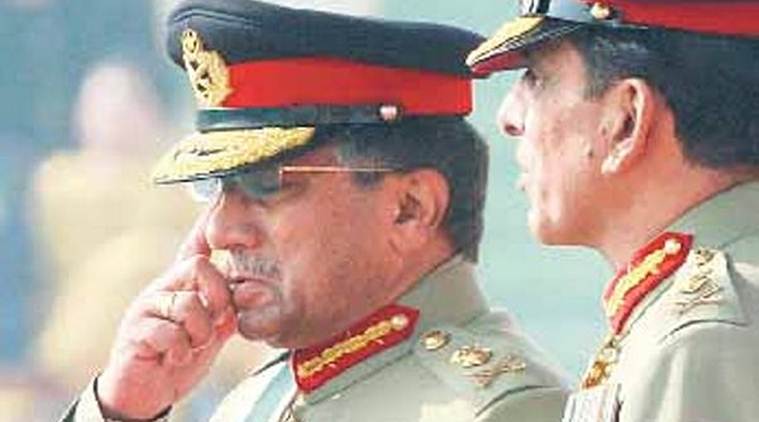The Cast Of Kargil
Musharraf placed officers who shared his orientation on Kashmir in key positions.

Army chief General Musharraf’s own orientation was that military force would play the key role in resolving the Kashmir issue. (Express archive photo)
The Kargil conflict between India and Pakistan ended in the defeat of the latter and led to the overthrow of an elected government in Islamabad, followed by almost a decade of military rule under General Pervez Musharraf, who is now facing a trial for treason. Shirin Mazari, a member of the ruling Pakistan Tehreek-e-Insaf of Imran Khan, wrote her book, The Kargil Conflict 1999: Separating Fact from Fiction, in 2003. In 2018, a different book on the same subject, From Kargil to the Coup: Events that Shook Pakistan, has been written by well-known Pakistan journalist Nasim Zehra. It would be interesting here to reproduce the portraits of the dramatis personae of the “operation”, as featured in Zehra’s revealing book.
Musharraf promoted vice chief of general staff, Major General Mohammad Aziz Khan to lieutenant general and appointed him chief of general staff (CGS) at the GHQ. The military chief also appointed Lt General Mahmud Ahmad, the recently-appointed commandant, National Defence College, as corps commander 10 Corps. Mahmud had been recently appointed as commandant, National Defence College after moving him from the post of director general, military intelligence.
Commander, Force Command Northern Areas (FCNA), Major General Javed Hasan was retained. At Washington as defence attaché, he would argue with colleagues that “the Americans would exercise benign neglect, if not active support, to a Pakistani military operation in Kashmir”.
With these appointments, Musharraf installed his men in the top command and staff positions directly dealing with the territory along the northern border. The only exception was Javed Hasan. GHQ retained him as commander FCNA. Hasan was widely regarded within the army high command as the best strategist who often maintained that “if Pakistan did not militarily and otherwise expand, they (India) will atrophy you”.
As director, military operations, Hasan was involved in monitoring the Kashmiri insurgency. In 1992-93, when Pakistan concluded that the insurgency’s spirit was depleting, the army facilitated the induction of “mehman (guest) mujahideen”. Like many of his colleagues, Hasan also followed subsequent Kashmir-related developments. For example, in 1996, the army’s assessment was that Kashmiris were “tending to stay away from the insurgency”. In 1998, the “guest” mujahedeen did not possess major weapons which could enable them to undertake spectacular manoeuvres. Hasan concluded after taking over FCNA: “We have to cross the borders.”
Mahmud Ahmed had joined the Pakistan Military Academy in 1966, immediately after the 1965 Pakistan-India war. He was a regimental colleague of Musharraf. Mahmud attended the army’s premier Command and Staff College in Quetta and subsequently became an instructor there for five years. First as a student of the Staff course and later as directing staff of the command and staff college, Mahmud oversaw a comprehensive research project on the 1965 Pakistan-India war.
While vastly different in strategy, calculation, and resource-deployment, the 1965 operation was also launched by Pakistan, as in 1947, to wrest Kashmir from India and, in Pakistan’s civil-military leadership’s calculation, to right a wrong. The general had also served as director, military operations at the GHQ, commanded the 23 Division of the 10 Corps, had served under the new army chief Musharraf when he was corps commander, Mangla, and was also Director-General Military Intelligence.
Significantly, the new chief of general staff, Aziz Khan, who had successfully launched the important Dalunang Operation across the LoC in 1988, was a strong proponent of Pakistani troops crossing the LoC. During the Dalunang Operation, Pakistan had captured 28 peaks. Emphasising his familiarity with the area, Aziz would often recall, “I have walked in the gaps along the LoC”.
Army chief General Musharraf’s own orientation was that military force would play the key role in resolving the Kashmir issue. In fact, this group of commanders was dismissive and distrusting of the role of diplomacy. As DGMO, Musharraf had war-gamed a Kargil-like situation — in which Pakistan would have militarily taken Kashmir — with then Prime Minister Benazir Bhutto. Musharraf himself recalled only that he had told the prime minister, “the time window for the resolution of the Kashmir dispute is short”. Clearly, the core team commanding the 10 Corps, including its FCNA brigade and the point-man at the GHQ, the chief of general staff, shared this orientation.
The writer is consulting editor, Newsweek Pakistan.
For all the latest Opinion News, download Indian Express App
More From Khaled Ahmed
- Consensual enslavementIslamic feminism has pushed back the women’s rights movement in Pakistan and reversed the movement for secularisation in the country..
- Hindu Pakistan? Not QuiteFanaticism has grown in India, but not been sanctified in its constitution, penal code ..
- Pakistan’s new captainPML-N’s clash with Pak establishment, a media revolution, played a role in Imran Khan’s victory ..








































No hay comentarios:
Publicar un comentario